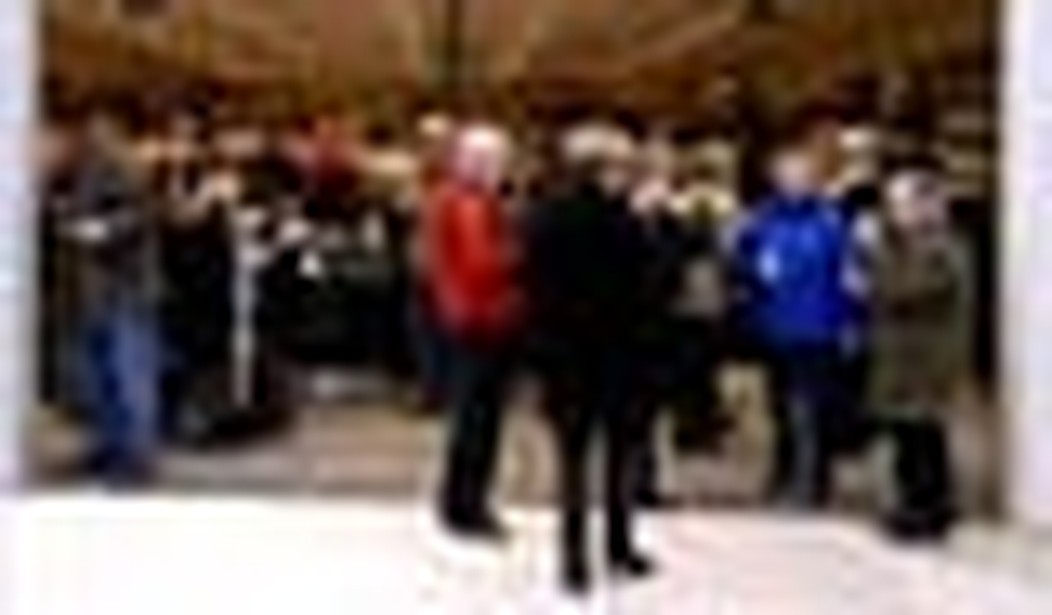A couple of days ago a friend of mine here in Norway, where I live, posted a note on Facebook in which he sardonically noted: “Think what it’ll be like if it becomes possible for adult people to buy a bottle of red wine…at 5 PM on a Saturday or — horrors! — 7 PM on a weekday.”
Here’s the background. In Norway, all wine and spirits are sold in government-owned stores dedicated strictly to that purpose. The stores — which collectively are known by the cozy name vinmonopolet, or “the wine monopoly” — are open from 10 to 6 on weekdays and 10 to 3 on Saturdays. They’re closed on Sundays and on all sorts of holidays. Around Christmas and Easter they’re closed for days at a stretch.
The number of stores is limited, determined not by market demand but, in good socialist fashion, by government fiat. In Oslo, a sprawling city with a population of over half a million, there are only 26 stores. And the prices — thanks to taxes designed to discourage potential customers and punish those who do buy — are the world’s highest. Norwegians go to Sweden to purchase cheaper intoxicants than they can get at home – and for the same reason Swedes go to Denmark, Danes to Germany, and Germans to Italy.
Norwegians gripe about all this, but their political establishment is in no rush to overturn the system. On alcohol policy, Norway’s major parties, whether on the Christian right, left, far-left, or so-far-left-they’d-give-Castro-the-bends, have traditionally been very comfy bedmates. They all love control, because they’re all sure they know what’s good for Norwegians a lot better than Norwegians do. For the Christian right, demon rum threatens family values; for the left, drinking distracts citizens from their duties to the socialist state.
The outlier here, as in pretty much everything else, is the Progress Party, which routinely introduces initiatives that its opponents warn will lead Norway down the path to (gasp!) “American conditions” — otherwise known as increased individual liberty. My Facebook friend’s post was, in fact, a reaction to the Progress Party’s radical proposal that (double gasp!) opening hours for the vinmonopol be extended to 8 PM on weekdays and 6 on Saturdays.
I felt compelled to comment on my friend’s post. I’d just come back from Baton Rouge, I wrote, and at the Walmart near my hotel you could get a big bottle of vodka for all of 10 bucks. For my part, I’d bought an extra-large bottle of Smirnoff — 1.75 liters — at the Albertsons megastore across the street from Walmart. The tab: $19.99 plus tax, for a total of $21.79.
How much would that have cost at Vinmonopolet? Well, first of all you wouldn’t be able to get that big a bottle of Smirnoff, except maybe on special order. But you could acquire just under the same amount — 1.70 liters — by purchasing two bottles, a one-liter and a 70-centiliter, for a total of NOK 694.80, or $123.27. In short, more than five and a half times the price in Baton Rouge.
What’s more, the Walmart was open 24 hours a day, seven days a week. Out of curiosity, I scoured the place for information about the hours during which alcohol was sold. In Norway, beer is sold in grocery stores, but only until 8 PM — at which time the beer shelves are carefully covered with a sheet, like a Muslim housewife.
When I learned that liquor can be sold in Louisiana all day and night, I was stunned. And then I was stunned at myself for being stunned. More than stunned — appalled, actually. I’m an American, but in that moment I realized I’ve lived in Norway so long that — for all my endless ranting about it — I’ve grown accustomed, on some level, to that illiberal, menacing, infantilizing monster, the Nanny State. Despite all my best efforts, I’d turned into somebody who was thrown by the idea of a laissez-faire liquor law. “I’ve lived in Norway so long,” I lamented on Facebook, “that I’ve forgotten what it’s like to live like an adult.”
Of course this isn’t about liquor — it’s about freedom. Liquor prices and opening hours are hard facts. But the larger subject here is a more elusive one, which involves not just facts but feelings. It’s about the whole experience of living in one kind of place or another. In some places, so many of the establishments and institutions that figure in your life are owned, run, and very strictly regulated by the government that it can feel as if you spend every day with the heavy hand of the state constantly on your shoulder. In other places, you just don’t have that feeling.
The latter sensation is called feeling free.
I’m not trying to make an argument here about the medical, social, or other consequences of selling liquor at a low or high price, or of making access to it easy or difficult. I’m concerned here with a higher distinction: the distinction between a society in which people grow up taking for granted their government’s right — and even duty — to control their lives, at every level, for (supposedly) their own good, and a society in which people recoil instinctively from such thinking, recognizing it, quite rightly, as a threat to their liberty. I’m talking about the difference between a place where the word bureaucrat has a positive ring to it and the word entrepreneur a negative one, and a place in which the reverse is the case.
This distinction isn’t just theoretical. For some of us, anyway, it’s palpable. It’s something you can sense — can feel in your bones — when you walk a city’s streets. Never mind that Norway, by some measures, does indeed come out ahead of, say, the state of Louisiana. The point is that that feeling of freedom matters more. It’s something the Founding Fathers understood; it’s something Emma Lazarus was on to when she wrote about “huddled masses yearning to breathe free.” There is such a thing as “breathing free” — and people who’ve spent their lives with that heavy hand on their shoulder know it in their bones.
What’s tragic is that many people who’ve breathed free all their lives just don’t appreciate it, the same way that people who’ve never experienced asthma don’t appreciate being able to, well, breathe. They’re quick to smile on freedom-quashing tyrants, from Castro to the Muslim Brotherhood, because those bullies are alleged to provide decent health care or other social services. This is our time’s great decadence: in the world’s freest nation, students at “top universities” cheer Mahmoud Ahmadinejad and mock a soldier who was wounded defending their freedom.
Living away from America for a long stretch can, indeed, cause you to forget what it’s like to live like an adult. But it can also help you to recognize — and cherish — that freedom the moment you get a taste of it again. If the kingdom of heaven is like a mustard seed, freedom is, among many other things, very much like a reasonably priced bottle of booze.









Join the conversation as a VIP Member